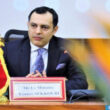Akhannouch said, in response to a central question at the House of Councillors during the monthly plenary session on the theme: “The Charter of Administrative Deconcentration and the challenge of territorial and social justice”, that aware of the regional dimension in the success of the work carried out in the health sector, the government has endeavored to create territorial health groupings to ensure optimal use of human and financial resources.
It is also about directing public investments according to an approach based on advanced regionalization, with the aim of establishing territorial justice in the health field throughout the national territory.
He added that the government is working towards the creation of a regional health map, to identify the potential of each region in terms of public and private sector infrastructures and human resources, which will enable territorial health groups to set priorities for investment in health and social protection at the level of each region, with a view to enriching regional health provision and reducing spatial disparities.
With regard to the education sector, Akhannouch pointed out that, through the national plan to accelerate the transformation of the higher education system, the government is working to establish a new university model based on integrated regional university clusters, in line with the objectives of advanced regionalization, adding that the aim of this approach is to make the university a source of attractiveness for the regions, taking into account the economic, social, cultural and environmental characteristics of each region.
Referring to the tourism sector, the Head of Government emphasized that the executive had taken the regional dimension into consideration in implementing the national strategic roadmap for the tourism sector 2023-2026, through the organization of regional assizes, which enable all parties concerned to meet and discuss the general framework and the various axes and objectives of this national tourism map.










